Cool jazz harpist
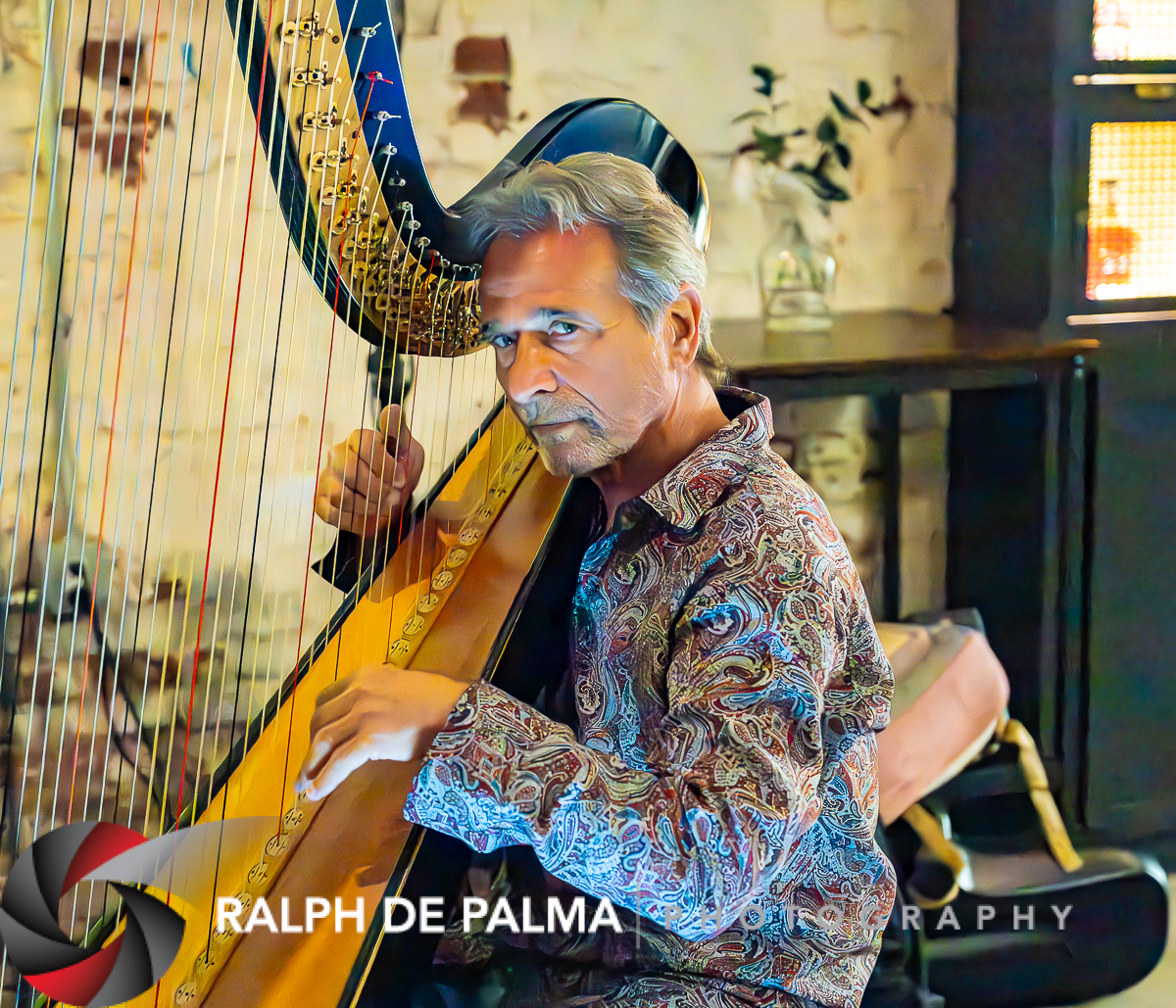
Scott Marischen performed with a very cool quintet at the Hemingway Social Club.
Scott Marischen – jazz harpist
Scott Marischen comes from a family of German heritage and musicians – his grandfather, father, mother, and two sisters played music. As growing up in Brooklyn, he played the piano as a child. Later he was mostly a jock until he heard the Allman Brothers and then learned to play guitar while in high school. He graduated in 1974.
He had a jazz guitar instructor at an independent music school. After hearing George Benson, he was hooked on jazz and began to play professionally. He attended SUNY (State University of New York) graduating with two degrees – health science and music.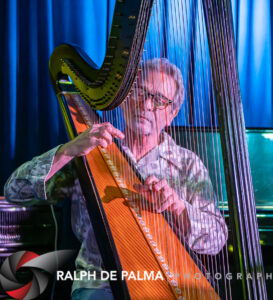
Scott credits Harpo of the Marx Brothers with his attraction to playing the harp. When he was a child, he would watch Harpo play the harp. While playing a gig in Clearwater, Florida, there was a psychic that saw him and, out of the blue, said “you should play the harp”. A couple of days later, he heard Andreas Vollenweider on CNN playing the harp. Then a few days later, he was working in a restaurant with a live harpist. They spoke and she gave him a card with the name of an instructor at the University of South Florida – Cathy Holm. He took six lessons and it was like he knew immediately what to do. Six months later (1987), Scott was playing the harp in Japan, three month gigs (visa restrictions) for almost three years.
He used all his jazz guitarist vocabulary and fluency and applied it to the harp, playing the harp like a jazz guitarist. Berkley School of Music now has a jazz harp course but it is a small community of musicians.
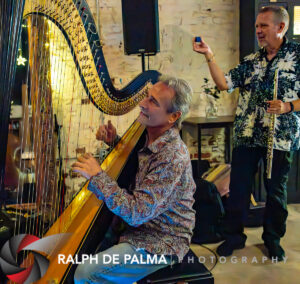
Scott Marischen and Mark Rose perform with a very cool quintet at the Hemingway Social Club.
The harp has seven pedals, for each note of the scales; red strings are C, black strings are F, etc. giving a visual reference. Moving the pedals changes the pitch of the strings and helps get that beautiful harp sound. In Key West, he can play barefoot which makes it easier to reach each pedal. Scott laughs, “It’s much more formal at the Breakers in Palm Beach.”
His parents moved to Port Charlotte and he would visit often. After working in Japan for several years, he got a gig at the Boca Raton Resort in 1990, playing harp six nights a week for three years. He started to work for other hotels and special events, and has built Marischen Music, a successful business booking bands, other musicians, sound, etc.
Scott has a very good friend, Patrick Harvey who lives on Big Pine Key and runs Grimal Grove Tropical Fruits who he visits often. On one of his visits, Patrick was holding a fundraiser in Key West and Scott brought down a couple of musicians to play. 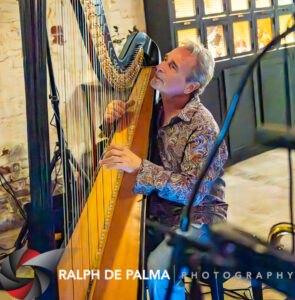 He met Harry Schroeder at the fundraiser who introduced him to other local jazz musicians. Schroeder and Skipper Kripitz helped get him his first local gig at the Gardens Hotel. Scott has become very popular and performs monthly at the Gardens during the season. He brings other musicians, including special jazz violinist, Debbie Spring.
He met Harry Schroeder at the fundraiser who introduced him to other local jazz musicians. Schroeder and Skipper Kripitz helped get him his first local gig at the Gardens Hotel. Scott has become very popular and performs monthly at the Gardens during the season. He brings other musicians, including special jazz violinist, Debbie Spring.
He has since visited Key West playing often with several groups at the Gardens Hotel, Little Room Jazz Club, and a recent gig with a stellar quintet at the Hemingway Social Club. Joe Dallas recruited Scott to perform jazz harp with the Paradise Big Band. He continues to play guitar with Joe and the big band.
He stays booked well in advance. He’s working on new projects with local saxophonist Mark Rose and is very impressed with other Key West musicians who are surprisingly great to work with and “can really play.”. He’s learning some new tunes and says he’s “in a groove, riding the wave”. He likes to play Reggae and a bit of Second Line stuff. Scott loves Pat Matheny, Michael Stern, and Chick Corea. He feels there are some very good supporters of music in Key West and credits the Gardens Hotel and Little Room Jazz Club for supporting jazz.
Scott has an album called Alligator Alley (the title song) with several of his original songs and a good cross section of covers from Sting to Miles Davis. He released the recording in the 90s and needs to record more jazz harp.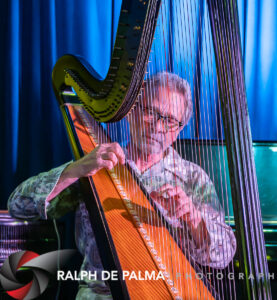
Young players learn music in formal university settings with all the new technology and techniques and come out playing very good and can really nail the music. But for someone that has played the same music for 20-30 years, you can tell the difference that “real” world experience makes.
To Scott, music is art – “It’s an indelible thing that connects people across the board from all walks.” Music has a special way of touching people. He tells the story of the famous award winning violinist, Joshua Bell, who played his million dollar Stradivarius violin in the New York subway. Most people walked by and dropped a buck in his case. Children seem to be the ones that would stop and listen intently. Music has that curious attraction for children. Scott says that’s why music education is so important. Here in the Keys, we agree with Scott and value our music education in every school.
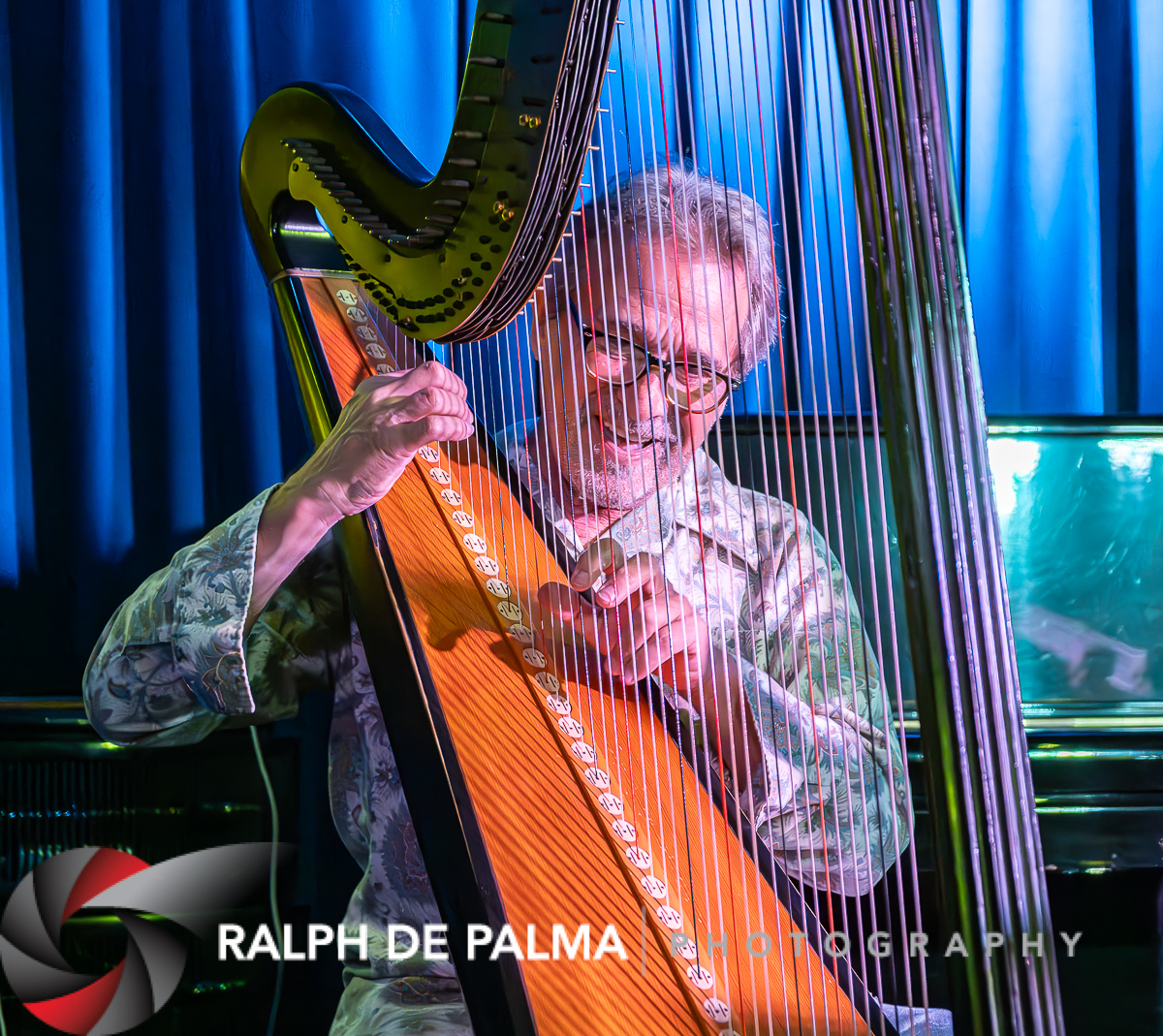
Scott Marischen enjoys his performance at the Little Room Jazz Club.
There are no comments yet, add one below.



Leave a Reply